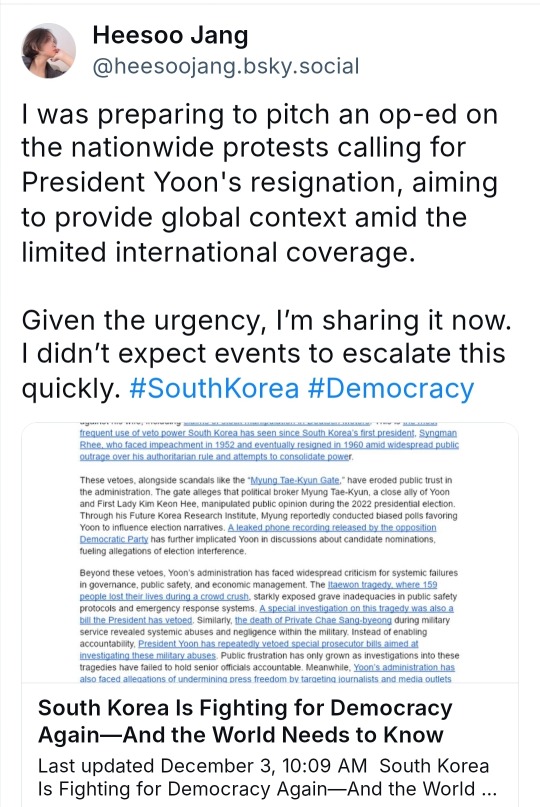#hesoo jang
Explore tagged Tumblr posts
Text
hadn't seen this on here yet

South Korea Is Fighting for Democracy Again—And the World Needs to Know
by Heesoo Jang
Assistant Professor of Media Law and Ethics, Journalism Department, University of Massachusetts Amherst
South Korea is once again at a critical juncture in its democratic history. More than a hundred thousand protesters, joined by over 4,000 professors and 1,466 Catholic priests announcing their declarations of the state of affairs, are calling for President Yoon Suk Yeol’s resignation. This echoes the massive movement that led to the impeachment of President Park Geun-hye in 2017 for corruption and abuse of power, showcasing South Koreans’ enduring commitment to holding leaders accountable.
What’s unfolding in South Korea is not just a domestic issue—it’s a reminder that democracies everywhere require constant vigilance. Yet, international media, like the BBC and AP News, have largely missed the bigger picture, focusing on soundbites and foreign policy instead of the underlying democratic struggles. This oversight leaves out important context for the global audience to understand the deeper context of widespread domestic dissatisfaction of the state of democracy in South Korea.
At the heart of the protests are allegations of corruption and abuse of power. President Yoon has exercised his veto power 25 times since 2023, blocking investigations into allegations against his wife, including claims of stock manipulation in Deutsch Motors. This is the most frequent use of veto power South Korea has seen since South Korea’s first president, Syngman Rhee, who faced impeachment in 1952 and eventually resigned in 1960 amid widespread public outrage over his authoritarian rule and attempts to consolidate power.
These vetoes, alongside scandals like the “Myung Tae-Kyun Gate,” have eroded public trust in the administration. The gate alleges that political broker Myung Tae-Kyun, a close ally of Yoon and First Lady Kim Keon Hee, manipulated public opinion during the 2022 presidential election. Through his Future Korea Research Institute, Myung reportedly conducted biased polls favoring Yoon to influence election narratives. A leaked phone recording released by the opposition Democratic Party has further implicated Yoon in discussions about candidate nominations, fueling allegations of election interference.
Beyond these vetoes, Yoon’s administration has faced widespread criticism for systemic failures in governance, public safety, and economic management. The Itaewon tragedy, where 159 people lost their lives during a crowd crush, starkly exposed grave inadequacies in public safety protocols and emergency response systems. A special investigation on this tragedy was also a bill the President has vetoed. Similarly, the death of Private Chae during military service revealed systemic abuses and negligence within the military. Instead of enabling accountability, President Yoon has repeatedly vetoed special prosecutor bills aimed at investigating these military abuses. Public frustration has only grown as investigations into these tragedies have failed to hold senior officials accountable. Meanwhile, Yoon’s administration has also faced allegations of undermining press freedom by targeting journalists and media outlets critical of the government.
Adding to these failures is a healthcare system on the brink of collapse, where prolonged medical staff shortages, exacerbated by budget cuts, have caused long-term disruptions in patient care. Instead of addressing these structural issues, the government has opted for a hasty increase in medical school quotas—a move experts warn will only further destabilize the system. Yoon’s economic policies have similarly drawn heavy criticism for favoring the wealthy with tax cuts while reducing public welfare budgets, deepening inequality between South Korea’s elites and its struggling middle and working classes. Rising household debt and record-breaking small business closures have fueled calls for reform, yet the administration’s inaction has only alienated the public further. Compounding these grievances, a 15% cut to South Korea’s research and development (R&D) budget has alarmed academics and scientists, who warn that this decision jeopardizes the nation’s innovation-driven economy and long-term global competitiveness—a concern echoed by prominent universities like Yonsei and Ewha Womans University, which cite these cuts as emblematic of broader governance failures.
Despite the scale of unrest, international media have failed to convey the full significance of this crisis. Instead of contextualizing public discontent and the erosion of democratic norms, they have focused on peripheral issues, ignoring the protests’ broader implications for democracy. This has also allowed misinformation to muddy the narrative internationally, preventing the international public from gaining important contextual information about what’s happening in South Korea. For example, posts on Chinese social media have falsely portrayed the protests as anti-war rallies rather than demands for accountability and reform.
South Korea’s struggle is a powerful reminder that democracy is not self-sustaining—it requires active vigilance. The protests and demands for reform exemplify how civil society can confront governance failures. The world deserves more context and a nuanced understanding from international journalism about what South Korean democracy is facing, as its fight for justice, transparency, and the rule of law holds lessons for all democracies.
#south korea#sk politics#bluesky#hesoo jang#please click through to the doc for links because there are many
44 notes
·
View notes